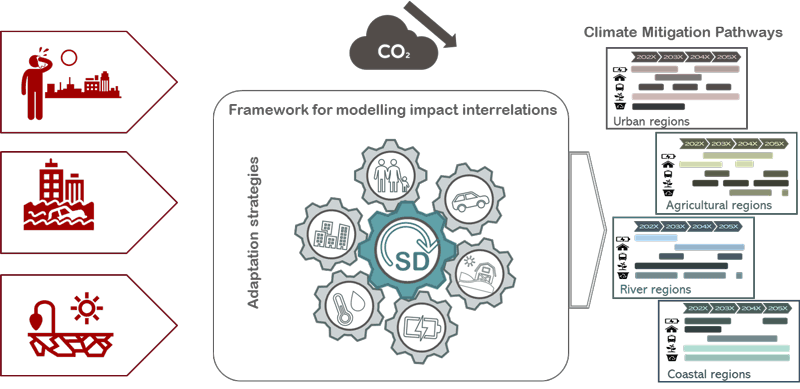by Alexandra Millonig and Marianne Bügelmayer-Blaschek (AIT Austrian Institute of Technology)
Human-made climate change is transforming our environment and confronting us with ever-increasing risks to our health and livelihoods. We therefore need to know how to avert even more serious consequences and how to adapt to the changes already happening. But that is not all, as we need to know whether the actions planned with respect to both aspects are mutually supporting or hindering. Only then can we achieve an effective, safe and just transformation.
Climate change has been globally recognised as an existential threat requiring urgent action to avoid catastrophic consequences. Hence, the EU’s Green Deal [L1] has been proposed “to make Europe the first climate-neutral continent in the world”. This includes not only the elimination of net emissions of greenhouse gases by 2050; this is to be achieved while decoupling economic growth from resource use and striving for a fair implementation, leaving no person and no place behind. This ambitious goal is additionally challenged by the need to adapt to unavoidable climate change impacts, which are already omnipresent.
Thus, there is an urgent need for an integrated approach for enhanced understanding of the interaction, complementarity and trade-offs between adaptation and mitigation measures, especially regarding the expected increase in regional mean temperature, changing precipitation pattern and soil moisture [1].
The Horizon Europe Research and Innovation Action KNOWING [L2] started 2022 and develops a framework for defining climate mitigation pathways based on understanding and integrated assessment of climate impacts, adaptation strategies and societal transformation. The modelling framework will be used to assess the interrelations between potential risks of climate responses, i.e. public and private adaptation and mitigation strategies. For instance, installation of air conditioning increases the quality of living conditions inside, but due to its heat and CO2 emissions, it has a two-fold negative impact. To quantify the interrelations, the chosen comprehensive approach builds upon a system dynamics (SD) model for quantifying cross-sectoral influences of measures taken in different sectors (e.g. energy, mobility, land use, construction, agriculture) affecting the overall emission budget. Based on this systems perspective, mitigation pathways along optimised combinations of interventions in the different sectors are developed. The framework also includes a coping-behaviour model that provides guidance on how measures can be implemented in an equitable way to enable a just and broadly supported transition.
The chosen approach is applied to different regions to allow for easy transfer of the resulting pathways to all regions of the same type. Each region is specifically related to a “Climate Impact Context (CIC)”: Soil Fertility and Agriculture (agricultural regions), Flooding and Infrastructure (river and coastal regions), and Heat and Health (urban regions, Figure 1). To ensure the applicability of the final mitigation pathways, they are developed together with stakeholders in four Demonstrator Regions situated in Germany, Spain, Italy and Estonia. Five Follower Regions in Austria, Spain, Germany, Croatia and Vietnam will adopt pathways with combined challenges from the CICs.

Figure 1: Main elements of the KNOWING project: climate-impact contexts, modelling framework – system dynamics (SD) and specific models for transport, etc. for climate mitigation and adaptation and resulting climate mitigation pathways.
Another central aspect of sustainable mitigation and adaptation actions is climate communication. It is crucial for the transition to a climate-resilient society, which requires a broad understanding of the complexities of climate actions. The knowledge and understanding are needed to enable informed decision-making at all levels of society from the everyday choices of the general public to the highest strategic decisions of policymakers. Hence, KNOWING puts particular effort in providing comprehensible and easy access to the results, which are going to be produced during the coming three years via the project website [L3] and social media [L4]. It addresses audiences from policy and administration, economy and industry, science and education, and civil society, thereby focusing on raising awareness for the complex nature of climate impacts and responses. Further, it provides the necessary knowledge and tools to minimise the response risks and enter low-emission pathways to reach climate neutrality and a liveable future.
During its further development, external support with additional experiences and active engagement is highly appreciated. Therefore, the project explicitly invites representatives from regions, science, stakeholder groups and the general public to join the extended team by taking a role in the project’s scientific and non-scientific advisory boards, as a follower region or by spreading the knowledge and inspiring others to explore how measures influence each other to take informed decisions.
Links:
[L1] https://tinyurl.com/38shv6vc
[L2] https://cordis.europa.eu/project/id/101056841
[L3] https://knowing-climate.eu/
[L4] https://tinyurl.com/483ujsur
Reference:
[1] IPCC, 2021, “Climate change 2021: the physical science basis”, Contribution of Working Group I to the Sixth Assessment Report of the Intergovernmental Panel on Climate Change, [Masson-Delmotte, et al. (eds.)]. Cambridge University Press, In press, doi:10.1017/9781009157896.
Please contact:
Alexandra Millonig and Marianne Bügelmayer-Blaschek, AIT Austrian Institute of Technology, Austria











